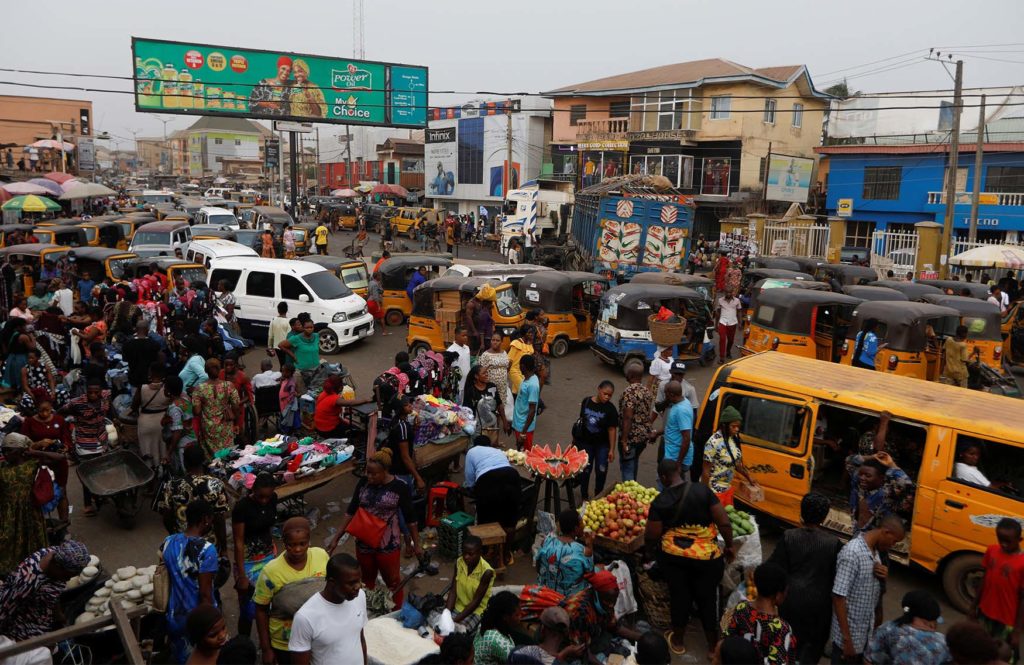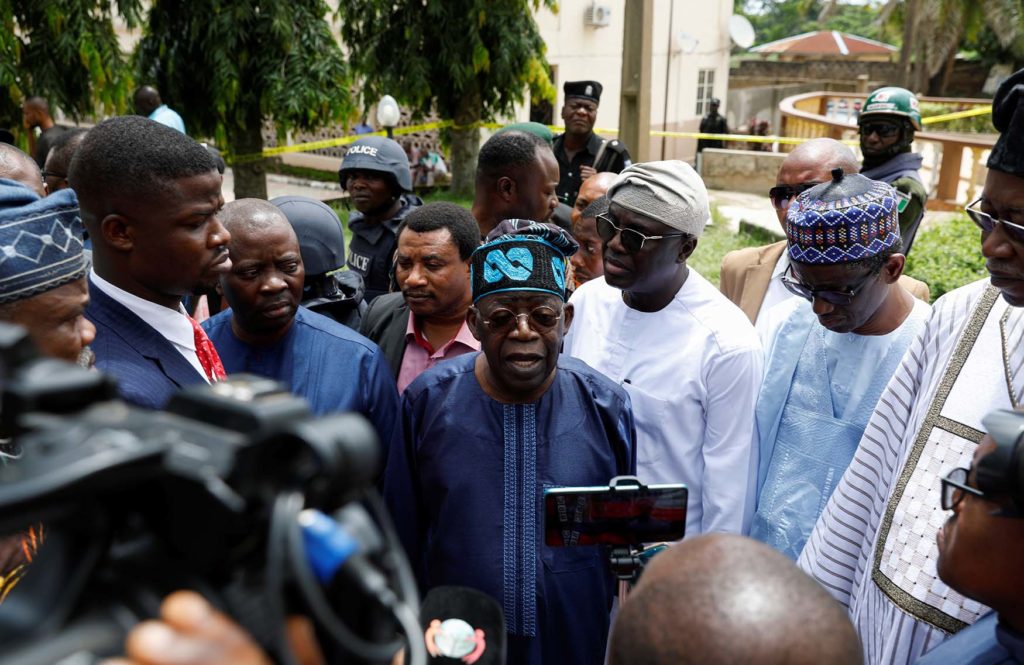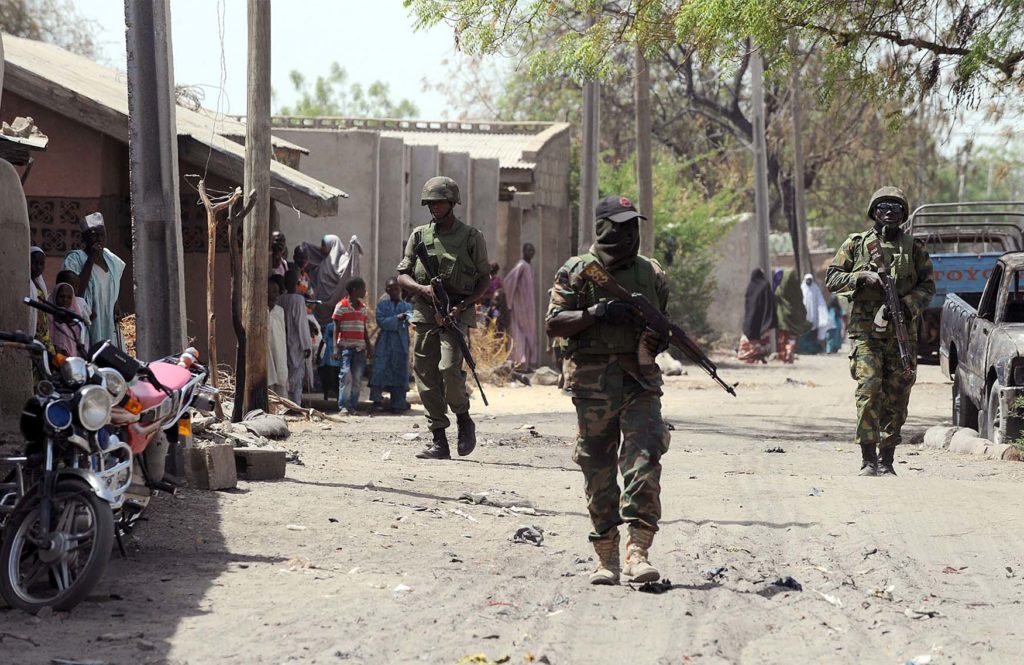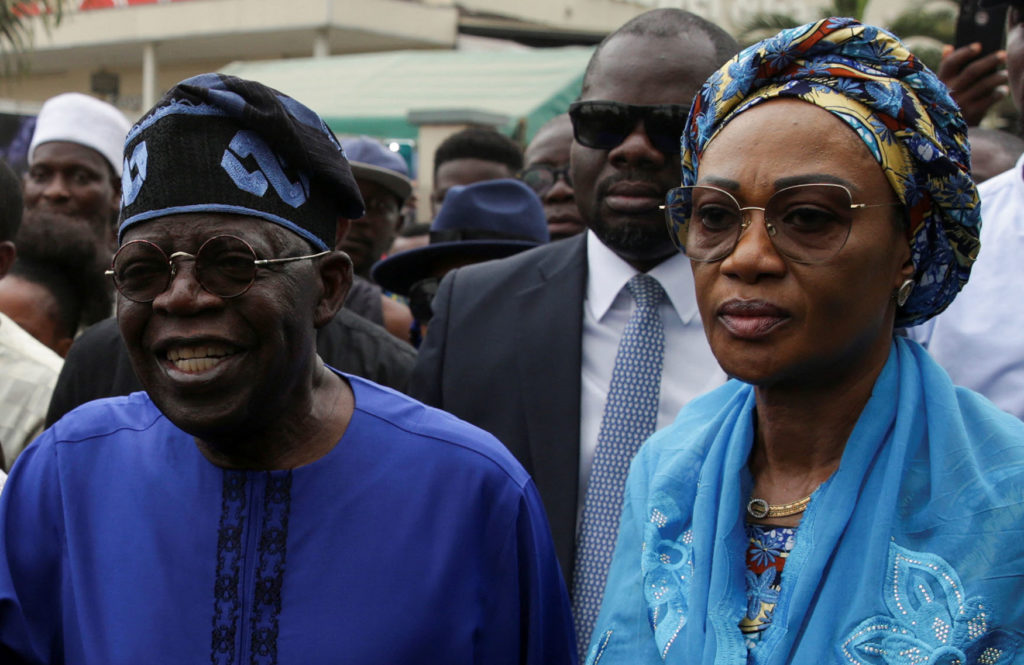Nigeria President Bola Tinubu took office while the nation was experiencing a multi-dimensional crisis. From raging inflation to widespread poverty, from large numbers of children not in schools to broken-down oil refineries and frequent mass shootings, almost every facet of Nigerian national life appears to be in trouble. Will President Tinubu be up to the task of turning all this around? Or will he be like previous presidents who left office with little to show for their tenures? He’s already taken some bold but harsh economic measures, promising they will yield prosperity in the long run. Will they work, or will the bitter medicine be too toxic for struggling Nigerians? Steve Wishnia reports.
Nigerian President Bola Ahmed Tinubu’s first action in office plunged the nation into a whorl of disputation. In his inaugural address May 29, he announced that he was ending the decades-old government subsidy for gasoline. “Fuel subsidy is gone,” he declared.
Tinubu and governors from his All Progressives Congress (APC) party argued that the subsidy was not financially sustainable. Last year, it cost the nation 4.3 trillion naira (then US$9.3 billion), more than the government spent on education and health care combined. But its end led to the Nigerian National Petroleum Company (NNPC) almost immediately tripling prices for gasoline – officially termed “Premium Motor Spirit” – from N190 a liter to around N540.
Nigeria’s two main labor federations, the Nigeria Labour Congress (NLC) and the Trade Union Congress (TUC), both immediately threatened nationwide strikes. The TUC demanded that the minimum wage, last raised in 2019, be increased from N30,000 a month to N200,000 to compensate for the fuel-price increase.

The repercussions were still popping more than two months later. “The fuel subsidy removal policy of the Federal Government has imposed untold hardship on the masses of Nigeria, especially its workforce, and we have to stand up against it,” Idris Lafene, the NLC’s chair in Niger State, told a rally Aug. 2, when the two unions demonstrated to demand “the immediate reversal of all anti-poor policies of the government.” The protests included an occupation of the National Assembly complex in Abuja and marches in Kano, Nigeria’s second-largest city, and Adamawa, Borno, and Yobe states.
The TUC said Aug. 1 that it supported removing the fuel subsidy, but not without measures to ameliorate its effect. “The policy was not thought through, which is why its impact is excruciating on Nigerians,” it said. “Sadly, when Nigerians cried out, the federal government proposed a paltry sum of N8,000 [about US$10] for poor families without details on mode of payment.”
In a televised speech July 31, President Tinubu told the nation that ending the fuel subsidy had already saved more than a trillion naira. He said the subsidy, which was instituted in 1973, had once been helpful, but had “transformed into a millstone around the country’s neck,” and the money “would have been better spent on public transportation, health care, schools, housing, and even national security.”
He promised to spend N500 billion over the next year to aid industry, small businesses, agriculture, and public transportation. “Sadly, there was an unavoidable lag between subsidy removal and these plans coming fully online,” he apologized. “However, we are swiftly closing the time gap. I plead with you to please have faith in our ability to deliver and in our concern for your well-being.”
The fuel subsidy is only one of several challenges facing Tinubu, a former governor of Lagos state, in succeeding Muhammadu Buhari as leader of Africa’s most populous nation. One is an economic crisis. Almost half of Nigeria’s estimated 220 million people – and by some measures, more – live below the international poverty line of $1.90 a day. Inflation is running at more than 20% a year, and one-third of working-age people are unemployed.
The country’s income from oil sales is declining. The naira’s exchange value plummeted by 36% within one day on June 14, from 0.22¢ to 0.15¢, when the Central Bank of Nigeria floated the currency. Its aim was to bring in more dollars by letting the market close the gap between the official exchange rate and the lower black-market rate.
Tinubu also has to confront nationwide violence, including attacks and kidnappings by the jihadist group Boko Haram in the northeast, clashes between cattle herders and farmers in the central region, Igbo separatists in the southeast, and widespread organized kidnapping.
The U.S.-based Council on Foreign Relations’ Nigeria Security Tracker estimated that more than 9,000 people were killed in 2022, down several hundred from 2021. The war with Boko Haram claimed more than 2,000 lives in the northeastern state of Borno last year, it said, while there were more than 2,700 killings and 3,000 kidnappings in the four northwestern states of Kaduna, Katsina, Niger, and Zamfara.

Tinubu has to handle all this with minority political support. He won the February election with only 37% of the vote, the lowest share of any president elected since Nigeria restored democracy in 1999.
In an unprecedented three-way race, former vice president Atiku Abubakar of the Peoples Democratic Party (PDP) won 29% and the Labour Party’s Peter Obi, a former governor of Anambra state, got 25%. The APC also lost its majority in the National Assembly. It held 59 of the 109 seats in the Senate, but lost 51 seats in the House of Representatives, winning only 176 of the 360 seats.
The PDP and Labour both disputed the election results, charging that there were irregularities in the vote-counting process. The cases were still pending in the Presidential Elections Petitions Court as of July, with a ruling expected before the end of the year.
The economic crisis
Nigeria’s major economic indicators are disastrous. Its gross domestic product per capita dropped by one-third from 2014 to 2021, to $2,066, according to World Bank figures. Inflation hit an annual rate of 22.4% in May, according to the Nigeria National Bureau of Statistics – the highest in 17 years.
The official unemployment rate grew from 9% in 2015 to 33.3% at the end of 2020, according to the most recent figures from the National Bureau of Statistics, and was 42.5% for the youth. Underemployment was above 20%.
The naira’s exchange value had already dropped by more than half over the seven years before it was floated in June. The federal government debt has increased by more than 50% since Muhammadu Buhari took office in 2015. At the end of 2022, it had reached N46.25 trillion, the Debt Management Office announced on March 31, with more than N2 trillion added in the fourth quarter of 2022. About 40% of that is owed to foreign creditors. Roughly 80% of government revenue went to debt payments, then Finance Minister Zainab Ahmed said in January.
The government’s debt might balloon to more than N77 trillion by the end of the year, Yemi Kale, chief economist for the accounting firm KPMG’s Nigeria office, projected in April, because of high-interest “ways and means” loans from the Central Bank and additional borrowing by the federal and state governments.
On June 12, in his Democracy Day broadcast, President Tinubu said that ending the fuel subsidy was a necessary sacrifice to “save our country from going under. I admit that the decision will impose extra burden on the masses of our people. I feel your pain.” He promised “massive investment in transportation infrastructure, education, regular power supply, health care, and other public utilities.”
Food prices skyrocket
On Aug. 16, Tinubu named banker Olawale Edun finance minister, replacing Ahmed. Most Nigerians are already losing ground financially, however. The minimum wage of N30,000 a month is about $44 at the new exchange rate.
If the minimum wage of 1974, during the first oil boom, were adjusted for inflation, it would be about N90,000 today, Zuhumnan Dapel, an economic research fellow at the Canada-based International Development Research Centre, wrote in the Lagos-based Guardian in June. To provide the same purchasing power it had in 1981, it would be N54,000.
Dapel said that between November 2009, when university professors last got a raise, and mid-2022, “inflation, heightened by currency depreciation,” had reduced their purchasing power from about $2,300 a month to $178.
Food prices have shot up faster than the general inflation rate. In May, they were 24.8% higher than they were a year earlier, according to the National Bureau of Statistics. The increase exceeded 30% in Ondo state east of Lagos, with Kogi and Kwara close behind. Since 2009, food prices have risen more than sevenfold nationally, and eightfold in Lagos state.
On July 13, Tinubu declared a state of food emergency, ordering the government to release 200,000 metric tons of grains to be distributed to households. He said the government intended to stabilize food prices, use fuel-subsidy savings to increase the amount of land farmed and improve infrastructure, and give farmers 225,000 metric tons of fertilizer and seedlings.
He also asked the Senate to approve paying $10 a month for six months to 12 million poor households to ease the hardship caused by the end of the fuel subsidy, and to accept an $800 million World Bank loan to pay for it.
Oil wealth not trickling down
Nigeria is Africa’s leading crude-oil producer, but that has not brought prosperity to much of the country. Its production declined from 2.5 million barrels a day in 2012 to 1.5 million in 2021, according to U.S. Energy Information Administration figures. In the third quarter of 2022, production briefly fell below 1 million barrels a day “because of significant and extended disruptions stemming from crude oil theft and pipeline vandalism.”
The country lost 620 million barrels of crude oil to theft, such as tapping into pipelines, between 2009 and 2020, according to a report released in April by the Nigerian Extractive Industries Transparency Initiative. Those losses cost the country $46.16 billion, it added.
“Governance and regulatory concerns have eroded investor confidence, diverting private capital needed for the development of critical oil and gas infrastructure,” the report said.
While Nigeria’s refinery capacity on paper is enough to “meet nearly all of its domestic demand,” the U.S. Energy Information Administration says, the country “is fully reliant on imported petroleum products … because its four state-owned refineries have been shut for long-term maintenance or rehabilitation since 2020, and it is unclear when or if these refineries will be brought back online.” Crude oil is shipped to Belgium and the Netherlands to be refined.
The Nigeria Labour Congress’s Lagos chair, Funmi Sessi, said that labor’s major expectation is ensuring that the four refineries are repaired. “If we have the refineries working, the market will not solely be for an individual to determine the market price,” she said in June.
Both oil marketers and labor unions have proposed mitigating gasoline-price increases by converting vehicles to compressed natural gas. Tinubu on July 31 said the government would spend N100 billion between now and March 2024 to acquire 3,000 20-seat CNG-fueled buses, offering transportation companies five-year loans at 9% interest to buy them.

Meanwhile, only about 55% of Nigerians have access to electricity, according to the World Bank, and only 36% use the Internet, less than the 58% in Ghana and the 43% in Senegal.
The National Bureau of Statistics estimates that 63% of Nigeria’s people, 133 million out of 211 million, are “multidimensionally poor,” lacking food, access to health care and education. Poverty is highest in the north, in states such as Sokoto, Kebbi, and Jigawa, and lowest in the Lagos area and parts of the southeast.
One figure is crucial in a fast-growing country where 43% of the people are under 15: Almost 40% of children between 5 and 11 years old are not in school. And one out of every five children in the world who don’t go to school live in Nigeria.
Violence
“Nigeria is at war,” Punch wrote in an editorial on June 5. “For too long, the criminals have had a field day and overwhelmed the existing security system. The ineptitude and compromises of previous governments compounded the situation.”
Eleven days in June illustrated the extent of the violence plaguing Nigeria.
On June 6, armed men attacked a Lagos-Abuja bus in the town of Isua in Ondo State, dragging 13 passengers off and marching them into the bush, a witness said. Police, soldiers, and other security personnel rescued them about 20 kilo- meters away, after killing one of the kidnappers in a gunfight.
That night in Kwara, four people were abducted while returning home from a naming ceremony in the village of Aboto. On June 9, in the town of Ijan, a 50-year-old woman and a nursing mother were seized by armed kidnappers who abandoned the younger woman’s baby, Kwara police said. The older woman was released on June 12 after ransom was paid; the mother was still being held.
On June 9, a gang of bandits slaughtered 25 people in a raid on Katako village. The next day, they killed 13 more people in the town of Kusherki. They then stormed the market in the Mariga local government area, where they injured scores of traders, robbed others of their sales proceeds, stole cattle, and kidnapped people.

In the early hours of June 12, heavily armed men invaded the community of Jangebe in Zamfara, where they shot a community health worker to death and abducted 46 people, the local media reported.
That same day, gunmen slaughtered 21 people in the community of Rawuru, in the north-central region’s Plateau state. Four days later, eight more were shot to death. Local activists and nongovernmental organizations said that in the previous month, 276 people in the area had been massacred and more than 30,000 displaced by the mayhem.
“Rural communities, always bracing themselves for the next bout of violence, are facing deadly attacks by rampaging killers,” Amnesty International’s acting Nigeria director, Isa Sanusi, said in a statement on June 14.
“The brazen failure of the authorities to protect the people of Nigeria is gradually becoming the ‘norm’ in the country. The government said it will enact security measures in response to these attacks, but these promises have not translated into meaningful action that protects the lives of vulnerable communities,” Sanusi added.
That man, Tinubu
President Tinubu has pledged to tackle the vicious violence and other numerous problems facing the nation, but the tough question is whether the solutions he chooses and his administrative and political ability are up to the task of solving them.
In the February 25 elections, Tinubu was the only presidential candidate with nationwide support. He led the field of 18 candidates with 8.8 million votes, 37% of the total and 1.8 million ahead of the PDP’s Atiku Abubakar, who got 29%. It was his first bid for the presidency.
Tinubu was the only candidate to meet the national-distribution requirement of winning at least 25% of the vote in at least two-thirds of Nigeria’s 36 states and the Abuja Federal Capital Territory. In contrast, Atiku’s support was concentrated in the north, and Peter Obi’s in the southeast, Lagos, and Abuja.
He was also the first Nigerian major-party candidate to break the tradition of having a religiously and regionally balanced ticket of a northern Muslim and southern Christian. He picked fellow Muslim Kashim Shettima, the former governor of the northeastern state of Borno, as his running mate.
Tinubu, 71, governor of Lagos state from 1999 to 2007, is a former Mobil Oil executive and investor, but is cagey about the sources of his wealth.
In his campaign, he said his main priorities were security and economic recovery. As governor of Lagos, he attracted much foreign investment to the area, expanded its bus system in an attempt to reduce traffic jams, and began the construction of a light-rail system. He claims that he modernized Lagos city, with new luxury apartments lining the Lekki Peninsula on its oceanfront.
He is considered the region’s political godfather, in helping form the APC and backing Muhammadu Buhari as its first presidential candidate, selecting proteges for his successors as governor, and patronage for public-sector jobs. “The kingmaker is now king,” the Abuja newspaper Premium Times declared, citing a Yoruba tradition that a kingmaker can never become king.
Tinubu has also been dogged by accusations of corruption. In the early 1990s, the U.S. government attempted to seize several bank accounts in his name, charging that they contained the proceeds of heroin sales. He settled out of court in 1993, agreeing to forfeit US$460,000.
Tinubu shakeup
Tinubu drastically shook up the government in his first weeks in office. On June 9, he suspended Central Bank of Nigeria governor Godwin Emefiele, the architect of the naira-bill redesign that caused a nationwide cash shortage.
Emefiele, who had headed the nation’s apex bank since 2014, was arrested the next day by the Department of State Security (DSS) and held without bail. He was initially being investigated for misappropriating funds, but no charges were filed until after a Federal Capital Territory High Court judge said he could not be held without being accused of something. On July 25, he was charged with illegal possession of a gun and ammunition, and bail was set at N20 million.
DSS officers rearrested Emefiele outside the court. He was indicted on procurement-fraud charges Aug. 15, allegations related to the purchase of about 100 buses and luxury cars worth about N6.9 billion.
On July 28, Tinubu appointed Jim Obazie, the chief executive of Nigeria’s Financial Reporting Council, as a special investigator to examine the Central Bank.
Tinubu also suspended Abdulrasheed Bawa, the chair of the Economic and Financial Crimes Commission, on June 14. Bawa, the youngest person ever to head the commission, was also arrested on suspicion of corruption. He was still being detained more than two and a half months later, without any charges filed.

On June 19, Tinubu fired and replaced the heads of all the major security services, all holdovers from the Buhari administration: the chiefs of staff for defense, the army, the navy, and air force; the inspector general of police, the chief of defense intelligence, and the comptroller general of customs.
Vanguard columnist Rotimi Fasan, a harsh critic of Buhari, praised the “house cleaning.” “That Tinubu could bench these star players of the Buhari team, along with taking a slew of tough decisions,” he wrote, “strengthened the aura of a formidable deal-maker that had surrounded Bola Tinubu for most of his time as a politician and is beginning to earn him the warm attention of critical sections of the public, including erstwhile opponents.”
But, Fasan added, “it’s too early to heap praises on the president.” Everyone desirous of seeing a new Nigeria, he continued, “should encourage such skepticism in those who do not see themselves eating out of the palm of the president, even if he appears to be the only palm available for now to keep them from starvation.”
Two months into President Tinubu’s tenure, many say it is too early to judge his performance, but he has drawn praise for his boldness. “The Bola Tinubu we are seeing now is far different from the frail, sickly-looking, and incoherent Tinubu we saw during the electioneering campaigns,” Chris Odi, a journalist and retired information ministry official in the south-south state of Bayelsa, told Vanguard. He added that terminating the fuel subsidy “will cause some pain in the short run, but will benefit the economy in the end.”
Former PDP official Ayo Fadaka took a harsher view. After Tinubu eliminated the fuel subsidy, he said, “inflation spiked up immediately and we further descended to penury.” Still, he added, Tinubu’s administration is an improvement on Buhari’s, which he called “prostrate, bereft of intuition, initiative, ideas, and action.” In the future, “President Tinubu must know that life is difficult for us and he must seek to take immediate actions towards ameliorating it, or else hunger and deprivation will begin to kill.”
“We will get out of this turbulence,” Tinubu said in his July 31 speech. “And, due to the measures we have taken, Nigeria will be better equipped and able to take advantage of the future that awaits her.”
“As the Yoruba people will say, history remembers both the king whose reign brought succor to the people and the one whose reign brought agony and pain,” Premium Times journalist Temidayo Akinboyo wrote after Tinubu was declared president-elect. “Tinubu has a chance to determine how history will remember his time.”